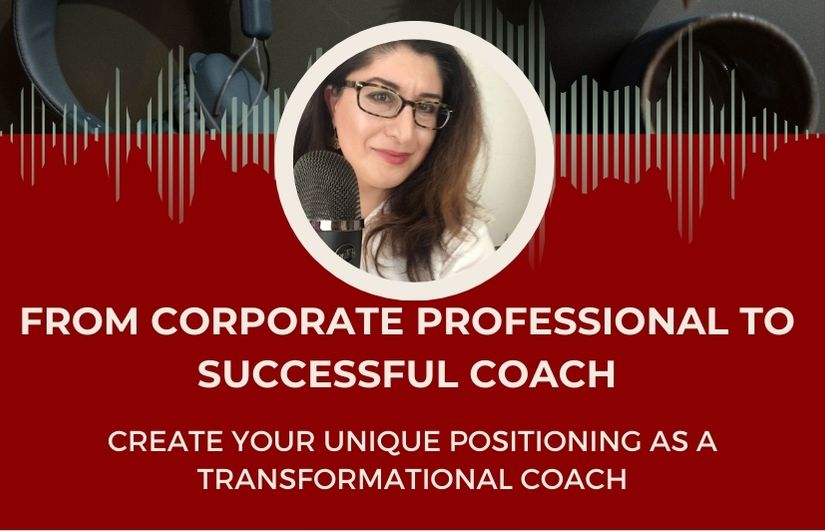
How to Seamlessly Transition from Corporate Technical Roles to a Rewarding Coaching Career: The Complete Guide for Engineers,Scientists & STEM professionals
Transitioning from corporate technical roles to a rewarding coaching career is a profound journey. It involves redefining your professional identity, embracing new responsibilities, and transitioning from specialist to multifaceted entrepreneur.
This comprehensive guide is designed for engineers, scientists, and STEM professionals who are eager to make this shift while maintaining a balance between their current career and coaching aspirations.
Drawing from my personal experience as an engineer turned coach, working primarily with corporate professionals undergoing coach training, I’ve observed that coaching is different from many other professions. It’s a skill set, not just an entrepreneurial venture, and many trained coaches begin this profession alongside their existing roles, integrating coaching into their current work.
This article will guide you step-by-step through how to transition from corporate technical roles to a coaching career for engineers and scientists, leveraging practical steps and personal insights.
Table of Contents
The Nature of Career Transition To Coaching
In the corporate world, professionals often find their identity closely tied to their job title and the organization they represent. Whether you’re a “Project Manager at X,” a “Scientist at Y,” or an “Engineer at Z,” your role often comes with built-in recognition and stability. However, transitioning from corporate technical roles to a coaching career for engineers and scientists means you have to redefine yourself. You become the brand, the service provider, and the entrepreneur. This shift may feel daunting, raising questions such as, “What if I fail?” or “What happens to my specialized expertise?”
For professionals in technical fields like science, technology, engineering, or finance, these concerns are understandable. The fear of losing the value of your hard-earned degrees and years of experience is valid, but it can be addressed. In coaching, your background in technical and analytical roles is actually a tremendous asset. You can leverage your expertise in new ways that will benefit your clients.
Gaining Relevant Coaching Certifications
Coaching is a skill that requires development. It’s not just about common sense—it’s about mastering a craft that helps people unlock their potential. One of the first steps to transition from corporate technical roles to a coaching career for engineers and scientists is to gain the necessary certifications. While your degrees and technical expertise are important, earning coaching certifications from reputable organizations like the International Coaching Federation (ICF) will enhance your credibility and professional standing.
The ICF offers globally recognized credentials that adhere to high ethical standards, which can bolster your confidence and trust in your new role.
**If you want to learn more about ICF codes of complaints and standards and running a coaching business that respects these standards see this article.
Mastering Client Attraction: The Key to a Successful Transition to Coaching
One of the most critical skills for transitioning from a corporate career to full-time coaching is mastering the art of client attraction. Without clients, you can’t practice your coaching skills, refine your craft, or build a sustainable business. For many aspiring coaches, this can feel like a daunting task—especially when starting without a large following, established audience, or prior business foundation.
Why Client Attraction Matters
Attracting clients isn’t just about generating income—it’s about creating opportunities to practice your coaching, gain confidence, and build credibility. Every client interaction sharpens your skills, deepens your understanding of client needs, and helps you develop as a coach.
How to Attract Clients as a New Coach
-
- Bring Clients to Your World: Learn to identify where your potential clients are and create opportunities for them to connect with you. This might involve networking, hosting workshops, or building an online presence.
-
- Showcase Your Value: Highlight your unique strengths, personal journey, and how your coaching can solve their specific problems. This is where understanding your niche and USP (unique selling proposition) becomes critical.How you connect with your audience and your marketing messaging plays a key role!
-
- Serve Powerfully: Deliver transformational coaching experiences that leave clients feeling seen, supported, and empowered. Exceptional service leads to referrals, testimonials, and repeat business, which are invaluable for growth.
Introducing My Educational Bundle for New Coaches
To help you attract the perfect fit clients you are most excited and qualified to serve, I’ve created a comprehensive audio+ video bundle designed for new coaches who come from technical, engineering corporate roles that have little in common with coaching.
This series covers all the practical steps you need to know, even if you’re starting with no audience, no social media following, and no established business foundation.
Here’s what’s included:
-
- How to attract your first paying clients without a following or fancy website.
-
- Building relationships and trust with your potential clients.
-
- Structuring offers that align with your coaching style and attract the right audience.
-
- Managing sales conversations with confidence and authenticity.
The key lessons are created in audio format so that you can listen to them on the go, but there are some video masterclasses and workbooks to support you in a comprehensive learning experience!
The Six Key Mindset and Identity Shifts for Transitioning from Technical Corporate Roles to Coaching
Embarking on a coaching career from a technical or analytical background requires several critical mindset and identity shifts:
From Specialist to Multifaceted Entrepreneur
-
- Old Mindset: In technical roles, professionals often focus on niche areas with defined responsibilities.
-
- New Mindset: As a coach and business owner, you need to embrace a broader role, becoming a business strategist, marketer, and coach simultaneously. This means shifting from being a subject matter expert to a multifaceted entrepreneur.
From Dependence on Credentials to Emphasizing Personal Value
-
- Old Mindset: Success in technical fields is often tied to degrees, certifications, and technical achievements.
-
- New Mindset: While your education and experience are assets, clients are primarily drawn to the results you can help them achieve. Your real power lies in how you use your specialized skills and background to create solutions tailored to your clients’ needs.
From Logical Proof to Trust in Intuition
-
- Old Mindset: Technical professionals are trained to rely on data, logic, and evidence-based conclusions.
-
- New Mindset: Coaching requires tapping into intuition and emotional intelligence. While logic has its place, successful coaching also demands trust in your ability to guide clients through uncertainties and emotional experiences.
From Structured Hierarchies to Creative Flexibility
-
- Old Mindset: Technical roles often involve structured hierarchies, defined processes, and predictable workflows.
-
- New Mindset: Running a coaching business means embracing ambiguity and becoming comfortable with less structure. Flexibility is key—you’ll need to adapt your approach, pivot strategies, and be innovative in the face of challenges.
From External Validation to Internal Validation
-
- Old Mindset: Success is often marked by external recognition—promotions, awards, and performance reviews.
-
- New Mindset: As a coach, you need to shift from seeking external validation to trusting your own inner voice and self-worth. It’s essential to stand confidently in your expertise, even if your coaching path looks different from others’.
From Employee Mindset to Entrepreneurial Mindset
-
- Old Mindset: In the technical world, job safety often depends on keeping higher-level management happy, and perfectionism is often celebrated.
-
- New Mindset: As an entrepreneur, you need to learn that you don’t need to do things perfectly and that sometimes it’s okay to be just 60-70% perfect to keep moving forward. This shift involves embracing a mindset of possibility and understanding that there is enough for everyone.
Common Fears and Limiting Beliefs in Transitioning to a Coaching Career
Transitioning to a coaching career often brings up several fears and limiting beliefs:
- Concerns about workplace reactions: You might worry about how your colleagues will judge your new coaching path.
- Fears of investment and failure: Investing time, money, and emotional energy into a new career can be daunting, especially with the possibility of not succeeding.
- Perceptions of a saturated market: The belief that “everyone is a coach these days” can make the field seem overcrowded and competitive.
These thoughts are your mind’s way of protecting you from risk and failure.
Acknowledging these fears is the first step toward overcoming them.
It’s not uncommon to encounter skepticism about the coaching profession.
In fact, I recall a meeting with a group of project managers where someone joked, “It seems everyone who’s tired of their corporate job is quitting and becoming a coach.” I’m sure you’ve heard similar comments.
But the reality is coaching is far more than just a career pivot—it’s a deeply transformative profession that requires skill, passion, and commitment. Building a thriving coaching business takes time, effort, and focus. Transitioning from corporate technical roles to a coaching career for engineers and scientists may take time, but the rewards are immense.
Remember, you are not responsible for other people’s opinions.
It’s essential to stay true to yourself; you can’t live a life that is approved by everyone else. Understanding your fears, distinguishing real fears from baseless worries, and living in alignment with your values are crucial.
As a coach, it’s important to walk your talk and demonstrate the courage you want your clients to have!
Techniques for Overcoming Limiting Beliefs
To address these fears and limiting beliefs, consider the following techniques:
– Fear-Setting Exercise: Inspired by Tim Ferriss, this exercise involves writing down your biggest fears and imagining the worst-case scenarios. Visualize what would happen if these fears came true and explore how you could mitigate or repair the situation. This exercise helps ground you and provides a sense of control.
– Internal Family Systems (IFS) Part’s WorkApproach: This is one of my favourite methods in transformational coaching around fears and sabotaging patterns.
In the IFS method ( by Richard Schwartz), you acknowledge that your limiting beliefs are like “parts” of you trying to protect you. They aren’t the enemy; they’re parts that need understanding and compassion. When you acknowledge them, you create the safety and space to show up as your most expansive, authentic self.
Creating a Safe Space for Establishing Your New Identity as Coach
To successfully transition from corporate technical roles to a coaching career for engineers and scientists, you must take deliberate actions to reinforce your new identity:
- Set Clear, Achievable Goals: Begin by outlining specific objectives, such as crafting your inaugural LinkedIn post to announce your coaching focus.
- Expand Your Comfort Zone Gradually: Start by offering your services to close friends or colleagues, then progressively introduce your new professional identity to a broader audience.
- Prioritise Self-Care: Engage in activities that promote relaxation and well-being, ensuring your body feels at ease during this transition.
Leveraging Your Technical & Analytical Skills in Coaching
Transitioning from a technical, engineering, or scientific role to coaching allows you to apply your specialized skills in new and impactful ways:
- Analytical Skills: Your proficiency in data analysis and pattern recognition can help clients gain deeper insights into their behaviours and thought processes.
- Problem-Solving Abilities: Your experience in tackling complex challenges equips you to assist clients in overcoming obstacles and developing effective solutions.
- Communication Skills: Effective communication is crucial in coaching, and your technical background has likely refined this skill, enabling you to convey complex concepts clearly.
By integrating these competencies, you can offer a unique coaching perspective that combines technical precision with personal development.
Conclusion
Transitioning from a corporate professional in technical or analytical fields (STEM) to a transformational coach could be a rewarding journey that allows you to make a significant impact on others’ lives while achieving personal fulfillment.
By embracing the necessary mindset shifts, leveraging your corporate experience, and following a structured approach, you can establish a successful coaching practice.
If you are navigating the same journey and want to learn more about practical actionable ideas about posting on social media and attracting clients then I invite you to check this comprehensive audio training bundle that I created for my private clients.
It’s designed specifically for professionals like you. This resource offers in-depth strategies to guide you through your transition from corporate technical roles to a coaching career for engineers and scientists.



